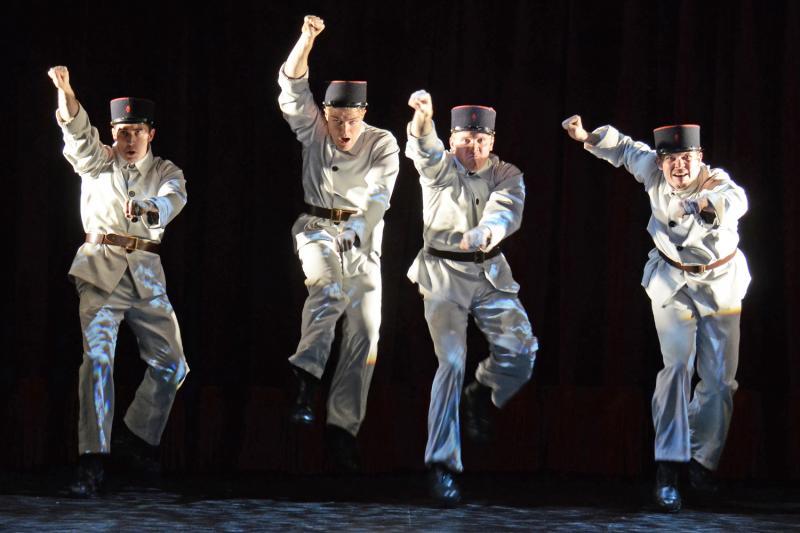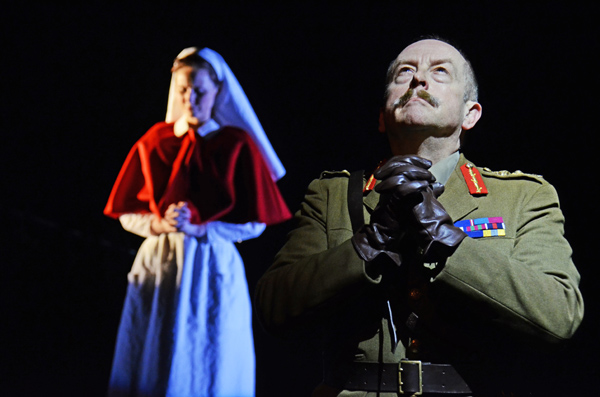Oh What a Lovely War, Theatre Royal Stratford East | reviews, news & interviews
Oh What a Lovely War, Theatre Royal Stratford East
Oh What a Lovely War, Theatre Royal Stratford East
Theatre Workshop’s anti-war classic is revived with more reverence than imagination

The trend of celebrating anniversaries by digging out old classics might suggest that no good new plays are being written, but at least it gives us the chance to re-assess their worth. Theatre Royal Stratford East, the legendary Joan Littlewood’s old venue, presents a new production of Oh What a Lovely War in its 60th anniversary year to coincide with the 100th anniversary of the First World War.
The idea for the musical originally came from BBC producer Charles Chilton’s 1962 Armistice Day radio programme, called The Long Long Trail, which used the songs of British troops in the First World War to enliven a documentary whose statistics and reminiscences recreated the atmosphere of life in the trenches. And which took some satirical potshots against the generals and political leaders whose incompetence led to unnecessary deaths. Many of the songs were standard hymns or tunes from West End shows — but the lyrics were made up by the common soldiery.
The songs were sung by ordinary men and women
The stage version was shaped by Littlewood and her Theatre Workshop company, and enjoyed a successful West End transfer, but was much less coherent in its embarrassing filmic incarnation. The current stage version, directed by Terry Johnson, at first glance adds little to the original, which famously used the end-of-the pier Edwardian pierrot show to entertain the audience while attacking the rich and powerful who were responsible for the war.
The keynote is contrast: while the cast sing and dance energetically at the front of the stage, behind them an electronic ticker-tape board lists the casualties of disastrous battles and the gains made (usually “Nil”). At the same time, there are various projections of original photographs from the Great War, which give the evening a documentary feel. I must say that I found most of this rather too familiar and too redolent of a cheery kind of political theatre which no longer has much resonance. In the 1960s, its point of view was radical: today it's banal. In the 1960s, people knew what a pierrot show was: today they don't.
 Things are not helped by this version's clumsy attempts at audience participation and the highly stereotypical representation of other European nations, complete with silly accents: compared to this, ’Allo, ’Allo is positively well rounded. Most of the acting and singing has a blatant theatricality which feels all wrong. Surely, the brilliant thing about the original production was that the songs had a hauntingly ordinary feel: they were sung by ordinary men and women. They were unadorned and unoperatic.
Things are not helped by this version's clumsy attempts at audience participation and the highly stereotypical representation of other European nations, complete with silly accents: compared to this, ’Allo, ’Allo is positively well rounded. Most of the acting and singing has a blatant theatricality which feels all wrong. Surely, the brilliant thing about the original production was that the songs had a hauntingly ordinary feel: they were sung by ordinary men and women. They were unadorned and unoperatic.
Occasionally, this production achieves this longed-for kind of emotional power: a lone voice heard across No Man’s Land sings “Stille Nacht”; British Tommies intone “We are Fred Karno's Army” or simply “We’re here because we’re here because we're here...”; a Belgian officer softly complains of his country being abandoned by the Allies. At other moments, a single shell blast reminds us of the shocks of war; nurses in bright red capes tend the injured; a leg sticks out of a mound of earth. And General Haig (pictured above) comes across, unfairly or not, as a rigid religious fanatic.
Yet at other times this staging is simply too fussy, too messy, too nostalgic: a kind of Downton Abbey on the Somme. Despite a solid ensemble cast led by Caroline Quentin and Michael Simkins, with music by Mike Dixon and choreography by Lynne Page, this production — like other revivals before it — ultimately fails to reimagine this classic for the present century. What it needs is a makeover, not a revival. Oh what a missed opportunity.
rating
Buy
Explore topics
Share this article
The future of Arts Journalism
You can stop theartsdesk.com closing!
We urgently need financing to survive. Our fundraising drive has thus far raised £49,000 but we need to reach £100,000 or we will be forced to close. Please contribute here: https://gofund.me/c3f6033d
And if you can forward this information to anyone who might assist, we’d be grateful.

Subscribe to theartsdesk.com
Thank you for continuing to read our work on theartsdesk.com. For unlimited access to every article in its entirety, including our archive of more than 15,000 pieces, we're asking for £5 per month or £40 per year. We feel it's a very good deal, and hope you do too.
To take a subscription now simply click here.
And if you're looking for that extra gift for a friend or family member, why not treat them to a theartsdesk.com gift subscription?
more Theatre
 Othello, Theatre Royal, Haymarket review - a surprising mix of stateliness and ironic humour
David Harewood and Toby Jones at odds
Othello, Theatre Royal, Haymarket review - a surprising mix of stateliness and ironic humour
David Harewood and Toby Jones at odds
 Macbeth, RSC, Stratford review - Glaswegian gangs and ghoulies prove gripping
Sam Heughan's Macbeth cannot quite find a home in a mobster pub
Macbeth, RSC, Stratford review - Glaswegian gangs and ghoulies prove gripping
Sam Heughan's Macbeth cannot quite find a home in a mobster pub
 The Line of Beauty, Almeida Theatre review - the 80s revisited in theatrically ravishing form
Alan Hollinghurst novel is cunningly filleted, very finely acted
The Line of Beauty, Almeida Theatre review - the 80s revisited in theatrically ravishing form
Alan Hollinghurst novel is cunningly filleted, very finely acted
 Wendy & Peter Pan, Barbican Theatre review - mixed bag of panto and comic play, turned up to 11
The RSC adaptation is aimed at children, though all will thrill to its spectacle
Wendy & Peter Pan, Barbican Theatre review - mixed bag of panto and comic play, turned up to 11
The RSC adaptation is aimed at children, though all will thrill to its spectacle
 Hedda, Orange Tree Theatre review - a monument reimagined, perhaps even improved
Scandinavian masterpiece transplanted into a London reeling from the ravages of war
Hedda, Orange Tree Theatre review - a monument reimagined, perhaps even improved
Scandinavian masterpiece transplanted into a London reeling from the ravages of war
 The Assembled Parties, Hampstead review - a rarity, a well-made play delivered straight
Witty but poignant tribute to the strength of family ties as all around disintegrates
The Assembled Parties, Hampstead review - a rarity, a well-made play delivered straight
Witty but poignant tribute to the strength of family ties as all around disintegrates
 Mary Page Marlowe, Old Vic review - a starry portrait of a splintered life
Tracy Letts's Off Broadway play makes a shimmeringly powerful London debut
Mary Page Marlowe, Old Vic review - a starry portrait of a splintered life
Tracy Letts's Off Broadway play makes a shimmeringly powerful London debut
 Little Brother, Soho Theatre review - light, bright but emotionally true
This Verity Bargate Award-winning dramedy is entertaining as well as thought provoking
Little Brother, Soho Theatre review - light, bright but emotionally true
This Verity Bargate Award-winning dramedy is entertaining as well as thought provoking
 The Unbelievers, Royal Court Theatre - grimly compelling, powerfully performed
Nick Payne's new play is amongst his best
The Unbelievers, Royal Court Theatre - grimly compelling, powerfully performed
Nick Payne's new play is amongst his best
 The Maids, Donmar Warehouse review - vibrant cast lost in a spectacular-looking fever dream
Kip Williams revises Genet, with little gained in the update except eye-popping visuals
The Maids, Donmar Warehouse review - vibrant cast lost in a spectacular-looking fever dream
Kip Williams revises Genet, with little gained in the update except eye-popping visuals
 Ragdoll, Jermyn Street Theatre review - compelling and emotionally truthful
Katherine Moar returns with a Patty Hearst-inspired follow up to her debut hit 'Farm Hall'
Ragdoll, Jermyn Street Theatre review - compelling and emotionally truthful
Katherine Moar returns with a Patty Hearst-inspired follow up to her debut hit 'Farm Hall'
 Troilus and Cressida, Globe Theatre review - a 'problem play' with added problems
Raucous and carnivalesque, but also ugly and incomprehensible
Troilus and Cressida, Globe Theatre review - a 'problem play' with added problems
Raucous and carnivalesque, but also ugly and incomprehensible

Add comment